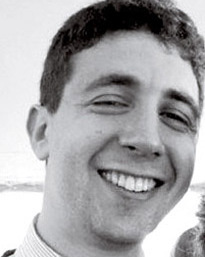 loading
loading
featuresThe Yale AirMemoirs from the evolution Mitchell Reich ’09 majored in classics and political science at Yale and was a managing editor of The New Journal, an undergraduate publication. He graduated in May.  Courtesy Mitchell Reich ’09View full imageWhen I came out to my dad the summer after my freshman year -- "Big news: I'm gay!" was my it-made-sense-at-the-time line -- he responded, without missing a beat, "News to who?" Well, news to me. My first week at Yale, in the Pierson courtyard, I saw another freshman and thought he was cute. With only 12 of 19 target years of education under my belt, I still managed to figure out what this meant. I experienced the Gay Ivy at its most merciless: five days at Yale, and my 18 years of pseudo-heterosexuality were obliterated. Just what in the Yale air caused this miraculous burst of self-awareness? I don't credit the concerted efforts that fall by the administration and students to convey the school's inclusiveness. Unlike many nervous gay freshmen, who are leaving a difficult home or unenlightened classmates, I disliked the sensitivity events during freshman orientation and couldn't imagine making a friend from the gay affinity groups. Institutional displays of tolerance remind me of my liberal high school in New York City, where teachers and guest speakers -- and even, on one surreal day, a bunch of my friends sitting around a living room -- would announce in the modern progressive parlance that it's okay to be gay. I never believed them. Every time the possibility of being gay crossed my mind, I felt certain of what coming out would mean: I couldn't continue to be myself if I were gay. At Yale, what was unsaid was immeasurably more persuasive than any of that. The sight of gay students walking around campus without acting gay, and the sight of no one caring if they did act gay, was entirely new to me. Here, the raison d'etre of strident gay identity had vanished, because an ecosystem like Yale's is apparently too hospitable to require it. Being gay at Yale, I realized, meant precisely the opposite of what I had always feared. Far from forcing me to change myself, coming out would liberate me to become more myself. And in those first wonderful months after coming out, that is precisely what I felt I was doing: jettisoning parts of me that I didn't like, becoming more fundamentally honest, learning to share myself more deeply with other people. Near the top of my list was a conviction that the gay Mitch would be no less free than the straight one in ambition or personality or musical taste. After the Massachusetts Supreme Court ruling, that seemed entirely possible: I could get any job I wanted, marry, have kids, be openly gay everywhere I went, and it wouldn't matter. If there is a present-day vision of paradise for gays in America, this is it. But I worry that the same effortless acceptance that makes Yale a vision of a post-gay future has also led me, quite unexpectedly, to wrap myself in gay identity. In these past four years, I haven't felt the need to adopt the in-group behaviors of first- or second-wave gay liberation in the way I talk, or the causes I do or don't pursue, but I have felt an internal pull to socialize increasingly exclusively with other gay guys. Gayness has become constitutive of my identity in a way no other part of me ever was. This is an outgrowth, I think, partly of the tribalism endemic to any sharply delineated social group, and partly of the zeal of a still-recent convert. But I've cocooned more and more mostly because it's so easy to cocoon at Yale, where gays are easy to find and there's no hint of stigma attached. Given that it was Yale's easygoing attitude toward gays that wooed me out of the closet in the first place, it's an ironic situation. My epiphany was always supposed to expand my world, never to limit it, and I'm disappointed in the contraction of my social panorama. But my real worry is prospective. Being gay at Yale hasn't entailed an ounce of social struggle, but I know the world is hardly so hospitable as Pierson. Twice when I've stepped out of the bubbles of central New Haven and Upper West Side Manhattan -- once on a plane with my boyfriend, a second time on a club dance floor -- I've managed to get called a faggot. Both times, I felt an incomparable ache to go back to Yale. But I know it was the pang of longing for a place that is only a temporary haven.
The comment period has expired.
|
|